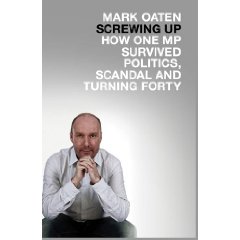Book review: Mark Oaten’s Screwing up
 The repeated references to the stress caused by going bald sums up the good and the bad of Mark Oaten’s autobiography.
The repeated references to the stress caused by going bald sums up the good and the bad of Mark Oaten’s autobiography.
In Screwing up: How one MP survived politics, scandal and turning forty, Mark Oaten tries to explain his mid-life crisis – its causes and its impact. Talking about the impact of going bald usually results in one of two reactions in people – a blank bemusement that losing some hair might cause more than a few grumbles and jokes or a sympathetic understanding of just how tough the psychological pressures people face can be, regardless of their cause.
To write for those in the blank bemusement camp it requires a real panache for explaining emotional turmoil in order to get beyond that bemusement. It’s a rare writer who has that skill, so it is no real criticism to say that Mark Oaten isn’t one of those. His fairly plain and straight-forward style gives bare bones statements of fact rather than helping the reader get inside the mind of someone they may feel they don’t understand at all.
As a result, one of the biggest puzzles of Oaten’s career – how could he have thought he could run for party leader with a big skeleton in his closet – is presented openly and bluntly, but also in so matter of fact a way – “It simply hadn’t occurred to me that this would ever come back to haunt me” – that again it doesn’t really explain the why.
More illumination is shed on Charles Kennedy and how his leadership and drinking struggled with each other:
If we had not liked, or admired, him so much then it would have been easy to tell him to sort the drinking out or quit, but very few had the heart or stomach to take on the issue. In all my time as his PPS, or as party chairman, I never once raised the question of his drinking with him.
Overall though the book does not take the reader on a coherent journey through Mark Oaten’s life or his mind, but instead presents a series of staccato different incidents, joined together by little other than being on the same page. His numerous stories of life as an MP can, individually, easily be imagined as an amusing opening to a political speech. There is also a refreshing degree of self-mockery in many of the stories. But strung together one after another the tales do not really take the book anywhere.
Again, the fairly plain writing style does not help. What could be very moving accounts of desperate poverty, meeting people facing the death sentence or troubled constituents instead come over as rather matter of fact. It is only when he recounts his flight from the media after his personal scandal broke and when he tallies the failures of recent governments that the writing rises to a level where it moves and enhances the facts of the story.
The book also suffers from a smattering of factual errors – a wrong name (it’s Alex Folkes), erroneous boundaries (the UAE doesn’t border Iraq) and misplaced anecdotes (the phone call to Paddy Ashdown was at the Newbury by-election, not the Winchester one).
Mark Oaten’s disdain for much of politics comes through. He didn’t think much of MPs, of Parliament or of the media. It does all leave rather a puzzle over why he was in politics at all.
But then, it isn’t only politics he dislikes for we get to hear that there is much else that he hates including changing rooms in clothes shops, injections, Morris Dancing, having to vote in person in Parliament, local newspaper photographers, ski lifts, shaving at weekends and bloggers or party members commenting on his media performances. To his credit, the public – although the cause of some frustrations – are not seen as the annoying distraction from “proper politics” that some memoirs suggest. No wonder though that Mark Oaten writes, “Perhaps I am becoming a grumpy old man”.
Perhaps too it explains why Mark Oaten had a mid-life crisis that involved more than just the jokes about baldness but also depression. Losing hair, getting fatter, getting older – it all bore down on him as did frequently feeling intellectually inferior and often being convinced he had serious medical ailments when in fact physically all was fine.
Despite this negativity, he is generous throughout the book in praising and thanking others, including mentioning by name the more junior people whose names often get left out of political accounts.
He clearly didn’t have much love of party activists in general – not just taking pot shots at Liberator magazine but also frequently referring to the strains as he saw it of having to convince party members to agree with him. Perhaps most telling of his estrangement from the party is one aside, written not as criticism, about one of his staff who, “refused to meet party activists unless absolutely necessary”.
Although he attacks party members for thinking him a right-winger, he also admits he thought about defecting to the Conservatives: “I was close to picking up the phone to Cameron’s office on a number of occasions”.
Near the end Mark Oaten considers the case for a privacy law, rejecting it but warning that although he has no real complaints over the media’s decision to cover his own case,
The press must always remember that what they do to sell a paper for just one day can leave somebody else picking up the pieces for a whole lifetime.
Overall, the book is decent middle-brow reading. It won’t make any list of the top political biographies, but it has more to it than a simple mea culpa over the scandal that ended his political career.
Leave a Reply